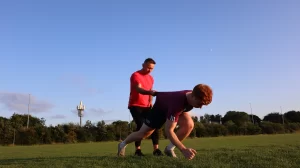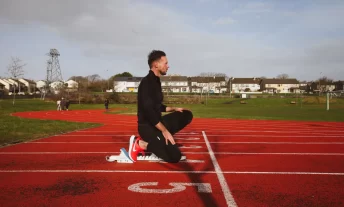
Speed is a crucial aspect of running, whether you're a beginner looking to improve your 5K time or an advanced athlete aiming for podium finishes in marathons. While traditional training methods like long runs and interval workouts are essential, incorporating plyometric exercises into your routine can take your speed development to the next level. Plyometrics, also known as jump training, focuses on explosive movements to enhance muscle power, agility, and overall athletic performance.
What Are Plyometrics?
Plyometrics involve quick, powerful movements that start with an eccentric (lengthening) muscle action immediately followed by a concentric (shortening) muscle action. These explosive movements help improve the stretch-shortening cycle of muscles, allowing for greater force production and speed.
Tips for Beginners:
- Start Slowly: If you're new to plyometrics, begin with basic exercises such as squat jumps, box jumps, or jumping lunges. Focus on proper form and technique before progressing to more advanced moves.
- Build a Foundation: Strengthening your lower body muscles is essential for plyometric training. Incorporate exercises like squats, lunges, and calf raises into your routine to build a solid foundation.
- Listen to Your Body: Plyometrics can be demanding on your muscles and joints, so pay attention to any signs of discomfort or fatigue. Start with 1-2 sessions per week and gradually increase the intensity as your body adapts.
- Use Proper Equipment: Ensure you have a stable surface and appropriate footwear for plyometric exercises to reduce the risk of injury.
Tips for Advanced Runners:
- Progressive Overload: As an advanced runner, challenge yourself by increasing the intensity and complexity of plyometric exercises. Experiment with variations like single-leg jumps, depth jumps, or bounding to continuously stimulate muscle adaptation.
- Incorporate Plyo into Your Routine: Integrate plyometric drills into your warm-up or cooldown routine to enhance neural activation and muscle recruitment. This can help improve your running economy and efficiency over time.
- Focus on Power and Speed: Emphasize explosive power and speed during plyometric movements. Aim to maximise your jump height or distance while maintaining proper form and control.
- Combine with Strength Training: Pair plyometrics with strength training exercises targeting key muscle groups involved in running, such as the quadriceps, hamstrings, and glutes. This holistic approach can improve overall performance and reduce the risk of overuse injuries.Plyometrics offer a dynamic and effective way to boost speed and performance for runners of all levels. By incorporating these explosive exercises into your training regimen and following the tips provided, you can enhance your running mechanics, increase stride length, and achieve new personal bests on the track or road. Remember to progress gradually, prioritise proper form, and listen to your body to minimise the risk of injury and maximise results.For personalised guidance and expert coaching in plyometrics and speed development, consider reaching out to Coach Jason Cafferkey. With over 12 years of experience and a proven track record of success, Coach Jason offers 1-on-1 coaching calls tailored to your specific needs and goals. Additionally, you can book track sessions with him to receive hands-on instruction and feedback to take your training to the next level.
Don't miss out on the opportunity to elevate your running performance with Coach Jason's guidance. Reach out today to schedule your consultation and start your journey towards faster, more efficient running. #Plyometrics #SpeedDevelopment #RunningCoach #AthleticTraining #PersonalizedCoaching #TrackSessions #ExpertGuidance

